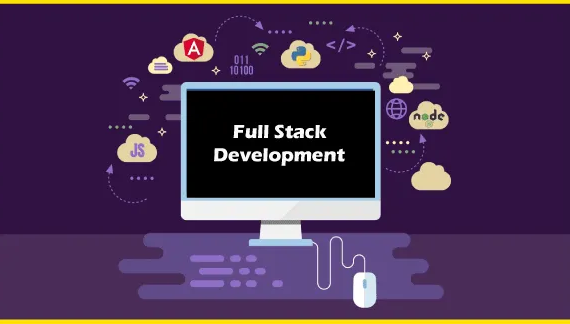Embarking on the journey of full stack development entails mastering a diverse set of skills that span both the front-end and back-end realms of web development. With the growing digital landscape continues to evolve at an accelerating pace, the demand for versatile full stack developers remains steadfast. These professionals serve as the architects behind seamless, end-to-end web applications, capable of bringing a project from conception to deployment. However, navigating this multifaceted field requires more than just technical proficiency; it demands a blend of creativity, problem-solving acumen, and adaptability. In this blog, we delve into the essential skills that aspiring full stack developers must cultivate to thrive in this dynamic and rewarding domain.
What is Full Stack?
Full stack development refers to the proficiency in both front-end and back-end web development. A full stack developer possesses the skills to work on all aspects of a web application, from designing user interfaces and implementing client-side functionality using technologies like HTML, CSS, and JavaScript, to managing server-side logic, databases, and server configuration with frameworks and languages like Node.js, Python, Ruby on Rails, or PHP. This comprehensive skill set enables full stack developers to build complete, end-to-end solutions independently or collaborate effectively within development teams, making them versatile and valuable assets in the rapidly evolving landscape of web development.
How to start a career in full stack?
To start a career in full stack development, begin by mastering fundamental web development languages like HTML, CSS, and JavaScript. Gain proficiency in back-end technologies such as Node.js, Python, or Ruby on Rails, and learn to work with databases like MySQL or MongoDB. Enrolling in a Full Stack Developer course can provide structured learning, hands-on projects, and mentorship, accelerating skill development. Build a strong portfolio showcasing projects demonstrating both front-end and back-end proficiency. Seek internships or entry-level positions to gain practical experience and continue learning and adapting to new technologies, frameworks, and industry trends to remain competitive in the field.
What is a Full Stack Developer?
A Full Stack Developer is skilled in both front-end and back-end web application development. They handle the entirety of a computer system application, proficiently managing both its visible features (the front end) and the underlying functionality (the back end). Front-end tasks involve browser programming with technologies like JavaScript, jQuery, Angular, or Vue, while back-end work involves server-side programming with PHP, ASP, Python, or Node. Consider Instagram: while users enjoy its seamless interface, numerous backend processes handle data retrieval and storage via HTTP requests. Full Stack Developers oversee every aspect of application development, from design to implementation, ensuring efficiency and reliability throughout.
Key Skills of Full Stack Developer
Becoming a successful full stack developer requires a diverse skill set that encompasses both front-end and back-end technologies, as well as proficiency in various tools and frameworks. Here’s an elaborate breakdown of the skills required for a full stack developer:
Front-End Development Skills
- HTML/CSS: Proficiency in building the structure and styling of web pages.
- JavaScript: Mastery in client-side scripting for interactive web elements and dynamic content.
- Front-End Frameworks: Knowledge of popular frameworks like React, Angular, or Vue.js for efficient development.
- Responsive Design: Ability to create websites that adapt to different screen sizes and devices.
- Version Control Systems: Experience with Git or SVN for managing code versions and collaboration.
Back-End Development Skills
- Server-Side Languages: Competence in languages like Node.js, Python, Ruby, PHP, or Java for implementing server logic.
- Web Servers: Understanding of web server technologies such as Express.js, Django, Flask, Rails, or Spring Boot.
- Databases: Proficiency in working with relational databases like PostgreSQL, MySQL, or SQL Server, as well as NoSQL databases like MongoDB or Firebase.
- API Design and Integration: Ability to design and integrate APIs for communication between front-end and back-end systems.
- Authentication and Authorization: Knowledge of implementing secure authentication and authorization mechanisms like OAuth, JWT, or session management.
Full Stack Development Skills:
- Understanding of HTTP/HTTPS Protocols: Knowledge of how web protocols work and how to utilize them for efficient communication.
- Cross-Platform Development: Ability to develop applications that run seamlessly across different platforms and browsers.
- DevOps Basics: Familiarity with deployment processes, continuous integration/continuous deployment (CI/CD), and containerization technologies like Docker.
- Testing and Debugging: Proficiency in writing unit tests, integration tests, and end-to-end tests to ensure code quality and functionality.
- Problem-Solving Skills: Aptitude for analyzing complex problems, debugging issues, and finding efficient solutions.
- Agile Methodologies: Understanding of Agile principles and practices for iterative and collaborative development.
Soft Skills
- Communication: Effective communication skills for collaborating with team members, understanding project requirements, and presenting solutions.
- Time Management: Ability to prioritize tasks, meet deadlines, and manage workload efficiently.
- Adaptability: Willingness to learn new technologies, adapt to changing project requirements, and stay updated with industry trends.
- Attention to Detail: Commitment to writing clean, maintainable code and adhering to coding standards and best practices.
A full stack developer should possess a well-rounded skill set encompassing front-end and back-end technologies, along with strong problem-solving abilities and effective communication skills. Continuous learning and staying updated with emerging technologies are also essential for success in this dynamic field.
Conclusion
Mastering the essential skills for full stack development is crucial for success in the dynamic world of web development. Proficiency in front-end technologies like JavaScript, HTML/CSS, and frameworks such as React or Angular, coupled with expertise in back-end languages like Node.js, Python, or Java, forms the foundation of a full stack developer’s toolkit. Additionally, knowledge of databases, API design, and version control systems is indispensable. Enrolling in a Full Stack Developer course provides structured learning, hands-on experience, and mentorship, accelerating skill development and providing a comprehensive understanding of both front-end and back-end development, thus paving the way for a rewarding career in full stack development.
